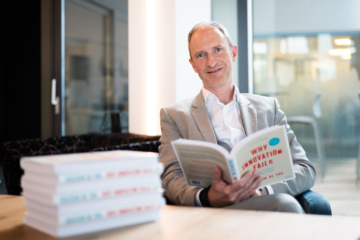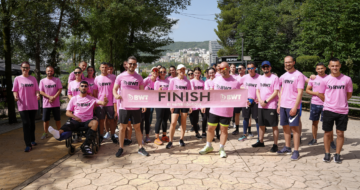Start to innovate: 7 keys to make your business future proof

With the launch of "Why Innovation Fails - 7 keys to success" Living Tomorrow CEO Joachim De Vos is handing a guide to the future for business leaders and policy makers. He provides insights into the technological revolution and how they can be turned into a concrete approach for successful innovation.
With the launch of "Why Innovation Fails - 7 keys to success" Living Tomorrow CEO Joachim De Vos is handing a guide to the future for business leaders and policy makers. He provides insights into the technological revolution and how they can be turned into a concrete approach for successful innovation.
With the launch of "Why Innovation Fails - 7 keys to success" Living Tomorrow CEO Joachim De Vos is handing a guide to the future for business leaders and policy makers. He provides insights into the technological revolution and how they can be turned into a concrete approach for successful innovation.
What led up to this point?
Ever since I was a young boy, I have been fascinated by knowledge and the future. I had a children’s encyclopaedia and I knew it completely by heart. My professional life has equally been driven by a passion for the future and innovation. And now, after 27 years with Living Tomorrow and interactions with hundreds of companies and organisations, it is time for a look back and a peek forward.
What did I learn?
That most companies are convinced of the need for innovation and are bursting with good intentions. They are doing their very best, they are genuinely concerned about their future and that of their employees and they provide the necessary budgets.
That innovations failed far more often than they succeeded. Many ideas died in the lab, did not catch on in the market, or were way too early and not adapted to the needs of the time.
That success always involves a bit of luck. I have learned the most from the negative things, the mistakes, the obstacles. Because that’s what makes one think: how could I have done this better?
So it became a book about how I experienced innovation in hundreds of organisations, large and small. How I learned to assess the future in order to be optimally prepared. Above all, it is an honest look at how I saw innovation succeed and fail.
So why this book?
We are currently facing the downside of the rapid economic recovery, due to a shortage of materials and energy. This contributes to more emissions and more extreme weather phenomena. Yet, we are all stuck in traffic again, we fly around the world for a pittance, we consume like crazy, leading to unprecedented scarcity worldwide.
Has innovation failed? I asked myself. How do we change our goal from 'back to normal' to 'the way forward' and embrace change, despite the many uncertainties? Because this is just the beginning, more storms are coming and it will force us to make lasting changes.
Therefore, innovation will eventually have to catch on and bring about a structural change. But that is not self-evident. Why does innovation so often remain a 'one off project'? Why is there no structure, no connection between the initiatives, no vision, no follow-up system? We can and must do better!
Future scenarios, structure and culture of innovation, ecosystems of partnerships: we can work with that. Feel free to call it a doctrine, because that is exactly what is needed. And if I can take away only just one company's fear of innovation with this book, my mission is accomplished!
How do we change our goal from 'back to normal' to 'the way forward' and embrace change, despite the many uncertainties?
What does this book hope to achieve?
Just like the House of the Future, this book is intended as a practical guide to discovering the future and how to prepare for it. Whether you are an established company, a start-up, a family business or a government, educational or healthcare institution, the book provides you with the practical tools and instruments to make innovation more successful.
Change is accelerating, technology is booming, the world is shaking. How do you gain insight into the secrets of the future, the universe of tomorrow? Why do we need to keep an eye on the future? What is innovation and what is it not? Where does it go wrong and why? How do you increase your chances to innovate successfully?
It is to answer these questions that this book came about, although I cannot answer all of them. That would be extremely arrogant in such a capriciously changing field as innovation. What I can do, is share the lessons I have learned in my life dedicated to innovation. Let’s build that bridge between today and tomorrow, now.
Will the change happen to you, or be driven by you?
Buy the book now
The book is available in English and Dutch.
Latest insights & stories

ROAD SAFETY
Since 2018, the number of traffic casualties in Flanders has risen again. Currently, the figures are stagnating, but the risk of accidents with injuries remains high for vulnerable road users in Flanders. And that while traffic should be safe for all users and modes. We want to change this by focusing on transparent policy, training on safe behavior, infrastructure improvements, legislation and enforcement.

What is needed for a more circular construction sector? Insights from Sien Cornillie, Circularity expert at NAV
NAV, or "Netwerk Architecten Vlaanderen," is a professional organisation for architects in Flanders. It offers various services including professional development and advocacy for the architectural sector. NAV also fosters networking opportunities and provides advice on legal, technical, and management aspects. The network is currently working on a position paper on circularity. We sat down with Sien Cornillie, an expert on circularity and energy at NAV. This interview reflects her own opinion.

A Global Movement: The World Unites in a Pink Pledge for Clean and Sustainable Water
5,000 participants. 32 countries. €30,000 funds raised. And that's just the beginning.
Picture this: One step that sends ripples across the globe, transforming lives and creating waves of change. You might wonder, how can such a simple action for most of us have such a profound impact?